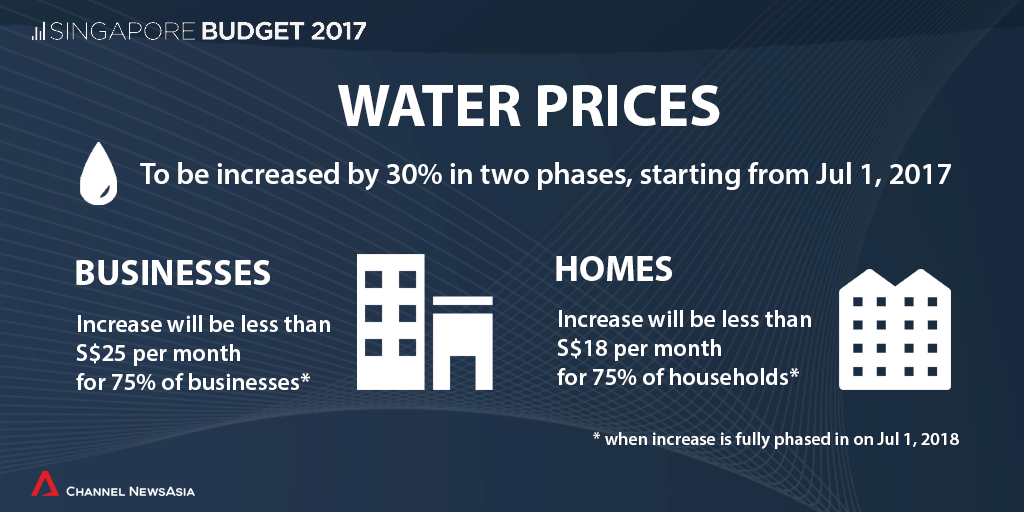[Breaking News] In response to the recent hikes in water prices, the government has announced new campaigns to help citizens conserve water. Molly Tan reports for the DNA.
Posted by Sng Yi Xian Issa on Thursday, 30 March 2017

Recently, one of the largest news topics in Singapore has been the 30% hike in water prices. Water prices have not increased in the past 17 years, but will do so this July.
Location, location!
Apologies for the poor audio quality! The area was very windy, and I only realised it post-broadcast. As some of my questions can’t be heard clearly, here they are:
Q: Do you know about the recent 30% increase in water prices?
Q: What have you and your family been doing to save water?
Q: The government has just announced a bathe-less campaign to help people to conserve water. They will be providing residents with a government-issued deodorant which can be collected at community centres. Will you be collecting your government-issued deodorant?
Q: The tagline for this new campaign is ‘One People, One Nation, One Scent’. Do you think this is effective? (This is a pun on a national slogan ‘One People, One Nation, One Singapore’)
Some Post-broadcast Thoughts
Although the interviewees were uncertain and slightly taken aback by the fake news, they responded to the questions sincerely and thoughtfully. They were really nice about it and perhaps this was due to their awareness of being filmed.
This week’s broadcast has made me more aware of the limitations of a phone camera when broadcasting. I’ll also have to project my voice more in the future, especially when the camera is further away!

Hi, I enjoyed reading your story, and I especially loved the fact that you used the people’s fear of water shortage as fake news.
Although some hydrologists firmly believe that “water scarcity” will be the next BIG world issue/war. So whether we conserve water by bathing less or using latrines or collecting rainwater, my question about the campaign for One people-nation-scent is: how thirsty are people for knowledge? Their thirst will determine how likely they are to believe the news/cause/request for a collective national identity.
I liked that you picked such an important topic, as a fish this is dear to my heart. It almost makes me overlook sources because you interviewed people on the spot, I wouldn’t want to look knowledgeable on camera! This really capitalizes on a great technique of fake news, the willingness to go along with a subject for fear of appearing out of touch or ignorant of current events.
Ging, great point about “the willingness to go along with a subject for fear of appearing out of touch or ignorant of current events”! The awareness and presence of the camera can be very influential. The gaze of the camera serves as a surrogate for potential viewers (aka critics) who watch the broadcast.
Hello there.
What a great idea for fake news! A concept that is almost believable and based in fact (rising prices) is the perfect target for fake news. The students who were interviewed seemed to seriously consider the implications of a bathe-less policy and if it would help the situation. I couldn’t help but think that an American response would be immediate outrage at being inconvenienced in such a way. I had a difficult time hearing the audio and I didn’t notice a “reveal” at the end or a moment when you told the students it was fake news. Did you tell the students at some point that it was fake news?
Thanks, Laura! No I didn’t reveal that it was fake news and simply left them wondering about the credibility of the information 😉
This form of satire can be very revealing, bringing humor to the issue, which as we have discussed, helps renew the argument, opening up a productive conversation about the responsibility of providing natural resources such as water to people at prices they can afford, as well as the people’s responsibility to conserve water in order to avoid shortages. The question I would have is how does the parody help to educate people, to help them think critically about the issue?
In this case, fake news parody makes people consider the possibility of such a reality. In Singapore, where our basic needs and more are provided for (affordable and clean water, efficient transport system etc.), it is easy to become complacent.
The interviewees are presented with an extreme situation where they have to stop and ponder the implications. This is the great strength of parody: it gets people thinking about possible realities and what they can do to prevent such a situation, all from the comfort and security of the present.
Yi Xian, your chosen topic suddenly reminded me of a past situation where there were no piped water to flush the toilets for a few days haha. The toilets stank to high heavens!
For water scarce places, this could perhaps be real news for them – the divide between real and fake news could not be too far off after all.